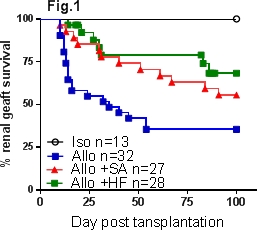High Fibre Diet Induces Donor Specific Kidney Allograft Tolerance in Mice
1Renal Medicine, Royal Prince Alfred Hospital, Sydney, Australia
2University of Sydney, Sydney, Australia
3The Children Hospital at Westmead, Sydney, Australia.
Meeting: 2018 American Transplant Congress
Abstract number: A409
Keywords: Graft survival, Kidney transplantation, Rejection, Tolerance
Session Information
Session Name: Poster Session A: Tolerance / Immune Deviation
Session Type: Poster Session
Date: Saturday, June 2, 2018
Session Time: 5:30pm-7:30pm
 Presentation Time: 5:30pm-7:30pm
Presentation Time: 5:30pm-7:30pm
Location: Hall 4EF
Aim: To investigate the impact of high fibre (HF) diet or dietary supplementation with the short chain fatty acid sodium acetate (SA) on kidney allograft rejection and survival in a murine model of kidney transplantation.
Methods: Kidney transplants were performed: BALB/c to B6, GPR43-/- and GPR109a-/- mice as allografts, and B6 to B6 (isografts). Mice were fed a HF diet for 2 weeks prior and throughout experiments (WT+HF), or received SA 200mg/kg ip for 14 days post-transplantation then SA 150mM solution orally (WT+SA; GPR43-/-+SA; GPR109a-/-+SA). Allograft controls received normal chow only (WT allografts). To deplete CD4+CD25+ cells in vivo, selected groups received anti-CD25 mAb (PC61).
Results: WT+HF allografts had significantly prolonged survival compared to WT allografts (Fig.1 p<0.01). HF feeding increased the release of SCFAs, particularly acetate. Similarly, WT+SA allografts were protected from both acute and chronic kidney allograft rejection with better renal function (p<0.05), less tubulitis (p<0.001) and increased CD4+Foxp3+ Treg accumulation at day 14 post-transplant, and improved renal function (p<0.05) and less proteinuria (p<0.001) at day 100 post-transplant versus WT allografts. WT+SA allografts exhibited superior survival to WT controls (Fig.1, p<0.05) due to the development of donor antigen specific tolerance, confirmed by acceptance of donor strain but rejection of 3rd party skin grafts. The survival benefit conferred by SA was broken by depletion of CD25+ Tregs (p<0.05). SA treatment was ineffective in GPR43-/- allograft recipients (GPR43-/-+SA, p<0.05). Studies of SA treatment of GPR109a-/- allograft mice (GPR109a-/-+SA) are underway.
Conclusions: HF diet or dietary supplementation with SA induced donor specific kidney allograft tolerance in a fully MHC mismatched murine model of kidney allograft rejection. Tolerance was dependent on a CD4+CD25+FoxP3+ regulatory mechanism. GPR43 is required for the molecular action of SA induced donor specific kidney allograft tolerance.
CITATION INFORMATION: Wu H., Kwan T., Loh Y., Wang C., Macia L., Alexander S., Chadban S. High Fibre Diet Induces Donor Specific Kidney Allograft Tolerance in Mice Am J Transplant. 2017;17 (suppl 3).
To cite this abstract in AMA style:
Wu H, Kwan T, Loh Y, Wang C, Macia L, Alexander S, Chadban S. High Fibre Diet Induces Donor Specific Kidney Allograft Tolerance in Mice [abstract]. https://atcmeetingabstracts.com/abstract/high-fibre-diet-induces-donor-specific-kidney-allograft-tolerance-in-mice/. Accessed February 20, 2026.« Back to 2018 American Transplant Congress

